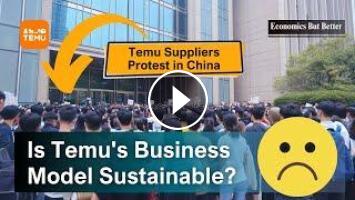Sections:
00:00 Introduction
01:17 Temu’s Business Model
04:00 Supplier Protests and Challenges
07:35 Is Temu’s Business Model Sustainable?
10:33 Broader Issues with Chinese Brands
13:25 Conclusion
Is the bargain you’re getting on Temu products worth the hidden cost? In this video, we explore the rapid rise of Temu, a global e-commerce sensation known for its unbeatable prices, and uncover the challenges behind its business model. Recent protests by suppliers in China reveal the financial hardships caused by Temu’s strict penalties and generous refund policies, raising serious questions about the sustainability of its practices.
We break down Temu's business model, which attracts millions of customers with extremely low prices while imposing hefty penalties on suppliers for after-sales issues. Temu's approach, including holding back a portion of supplier payments as reserves against disputes, places immense financial pressure on the very suppliers that keep its platform running. This model benefits customers but creates significant challenges for suppliers.
The video highlights the recent supplier protests in Guangzhou, where suppliers demanded fair treatment and resolution of their issues. Stories like that of Xiang Shihua, a garment-factory owner who lost $41,000 and had to lay off all his workers due to fines and withheld payments, illustrate the severe impact of Temu's practices on small business owners.
We analyze the sustainability of Temu’s business model, questioning whether it can continue to thrive without driving its suppliers out of business. The economic context of sluggish growth and a real-estate downturn in China adds to the suppliers' difficulties. Experts warn that a business model heavily penalizing its supply chain may achieve short-term gains but struggle with long-term sustainability.
We also discuss broader issues faced by many Chinese brands like Shein, which prioritize low prices at the expense of quality and sustainability. These brands often face criticism for their business practices, raising concerns about their long-term viability and ethical standards.
In conclusion, we reflect on the significant challenges Temu’s rapid rise brings and emphasize the importance of considering the sustainability and ethical implications of our purchasing choices. Join us as we explore the hidden costs behind those great deals and think critically about the broader impacts on the market.
#Temu #BusinessModel #Ecommerce #SupplierProtests #Sustainability #LowPrices #ChineseBrands #FastFashion #EconomicImpact #ConsumerAwareness #china #chinaeconomy #chinanews #chinastudy
00:00 Introduction
01:17 Temu’s Business Model
04:00 Supplier Protests and Challenges
07:35 Is Temu’s Business Model Sustainable?
10:33 Broader Issues with Chinese Brands
13:25 Conclusion
Is the bargain you’re getting on Temu products worth the hidden cost? In this video, we explore the rapid rise of Temu, a global e-commerce sensation known for its unbeatable prices, and uncover the challenges behind its business model. Recent protests by suppliers in China reveal the financial hardships caused by Temu’s strict penalties and generous refund policies, raising serious questions about the sustainability of its practices.
We break down Temu's business model, which attracts millions of customers with extremely low prices while imposing hefty penalties on suppliers for after-sales issues. Temu's approach, including holding back a portion of supplier payments as reserves against disputes, places immense financial pressure on the very suppliers that keep its platform running. This model benefits customers but creates significant challenges for suppliers.
The video highlights the recent supplier protests in Guangzhou, where suppliers demanded fair treatment and resolution of their issues. Stories like that of Xiang Shihua, a garment-factory owner who lost $41,000 and had to lay off all his workers due to fines and withheld payments, illustrate the severe impact of Temu's practices on small business owners.
We analyze the sustainability of Temu’s business model, questioning whether it can continue to thrive without driving its suppliers out of business. The economic context of sluggish growth and a real-estate downturn in China adds to the suppliers' difficulties. Experts warn that a business model heavily penalizing its supply chain may achieve short-term gains but struggle with long-term sustainability.
We also discuss broader issues faced by many Chinese brands like Shein, which prioritize low prices at the expense of quality and sustainability. These brands often face criticism for their business practices, raising concerns about their long-term viability and ethical standards.
In conclusion, we reflect on the significant challenges Temu’s rapid rise brings and emphasize the importance of considering the sustainability and ethical implications of our purchasing choices. Join us as we explore the hidden costs behind those great deals and think critically about the broader impacts on the market.
#Temu #BusinessModel #Ecommerce #SupplierProtests #Sustainability #LowPrices #ChineseBrands #FastFashion #EconomicImpact #ConsumerAwareness #china #chinaeconomy #chinanews #chinastudy
- Catégories
- E commerce Divers
- Mots-clés
- Temu, Business Model, Ecommerce














Commentaires